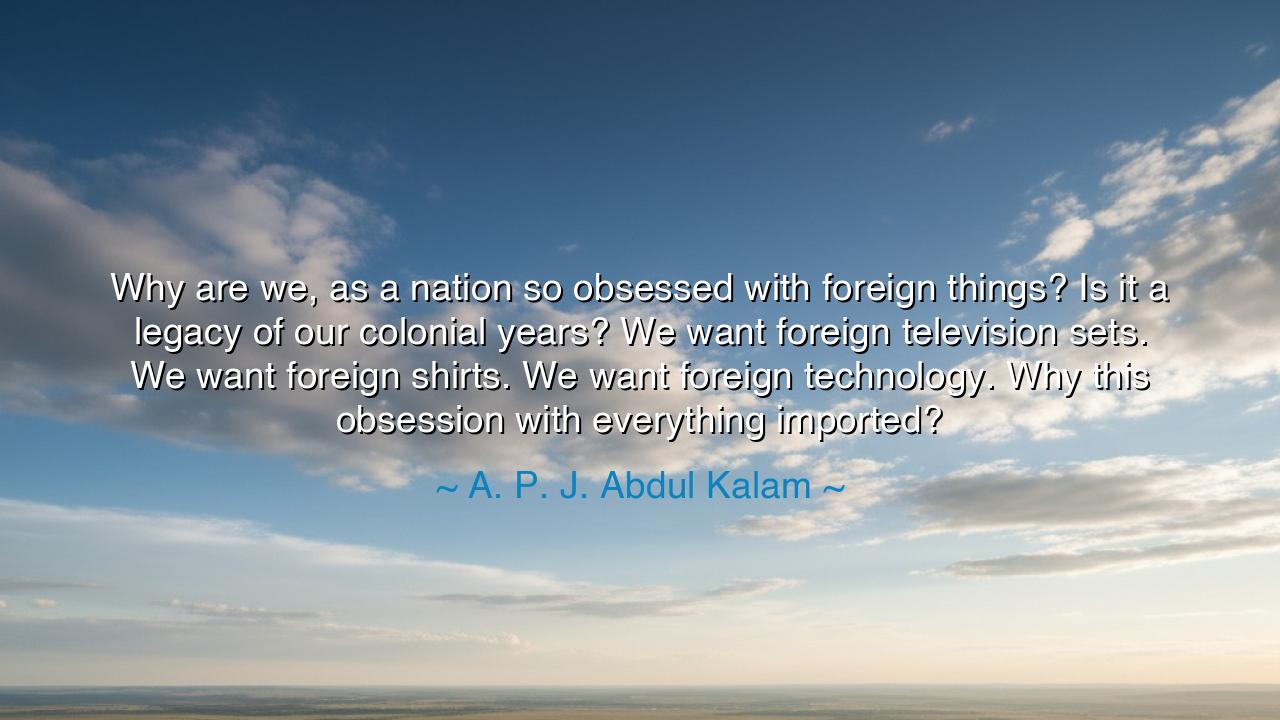
Why are we, as a nation so obsessed with foreign things? Is it a
Why are we, as a nation so obsessed with foreign things? Is it a legacy of our colonial years? We want foreign television sets. We want foreign shirts. We want foreign technology. Why this obsession with everything imported?






Hear the stirring lament and challenge of A. P. J. Abdul Kalam, the son of India who rose from humble shores to the heights of science and leadership. He asked with piercing voice: “Why are we, as a nation, so obsessed with foreign things? Is it a legacy of our colonial years? We want foreign television sets. We want foreign shirts. We want foreign technology. Why this obsession with everything imported?” In these words lies a cry both sorrowful and fierce, a call for self-respect and a warning against the chains that still bind the spirit of a people long after the conqueror has left.
For history teaches that centuries of colonial rule plant seeds of dependence. When a people are told that their ways are inferior, when they are taught to value the goods and customs of their rulers above their own, a wound forms in the soul of the nation. Even after freedom is won, the wound lingers. A taste for the foreign lingers like a shadow, as if only what comes from beyond the seas holds worth, while the crafts, knowledge, and inventions of one’s own land seem lesser. Kalam saw this shadow still cast across India, and he sought to awaken his people to pride in their own genius.
Recall the story of Japan after the Meiji Restoration. That nation too looked to foreign lands for guidance, for machines, for methods of governance. But unlike those who fall into worship of the imported, Japan absorbed what was useful and fused it with its own traditions, producing strength without losing identity. In time, their industries rivaled those they once admired. This is what Kalam longed for India: not rejection of the world, but the courage to stand equal among nations by building upon its own foundation.
His words remind us that technology and culture are not treasures to be borrowed endlessly from others, but to be created, nurtured, and proudly displayed by one’s own people. A nation obsessed with imports weakens its own craftsmen, scientists, and thinkers, draining vitality from within. But a nation that honors its own work, while still learning wisely from the outside, grows strong in both self-respect and prosperity. To depend blindly on others is to remain a servant in spirit, even if free in body.
Let us be clear: Kalam’s challenge was not against the world, but against self-doubt. His heart burned with the belief that India’s children could create their own shirts, their own machines, their own satellites, their own dreams. He wanted his people to see that the mind which builds a rocket does not need to envy the mind which builds a foreign television. He wanted to cut the chain of inferiority and awaken the flame of confidence.
The lesson is timeless: in every land, in every heart, beware the worship of what belongs to another. Learn from others, yes, but do not despise your own gifts. To admire blindly what is imported, while scorning what is local, is to wither the soul of a people. True dignity comes not from possession of foreign goods, but from creation, invention, and labor that springs from one’s own soil.
Take action, O listener. Support the crafts of your land. Nurture local talent. Learn from the wisdom of other nations, but do not let your admiration turn into bondage. Build, invent, and create, even if your first fruits seem small compared to the polished goods of others. For in that creation lies freedom, and in freedom lies greatness.
Thus the words of Abdul Kalam resound like a clarion call across the ages: “Why this obsession with everything imported?” The answer he sought was not despair, but renewal. Let us then honor his vision by becoming makers, not merely buyers; creators, not merely imitators. For only when a people believe in the worth of their own hands and minds shall they truly walk as equals among the nations.






AAdministratorAdministrator
Welcome, honored guests. Please leave a comment, we will respond soon